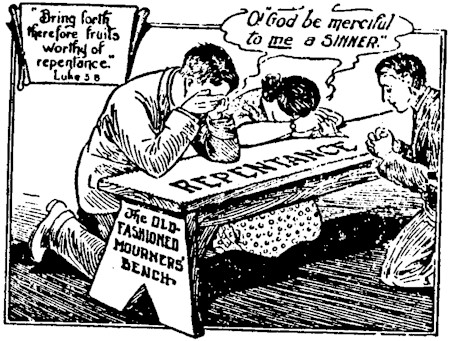by Mitch Hescox
I have a confession. I’m an evangelical Christian and I love to share Jesus. I love to tell the story of Jesus and his love. Jesus’ story is a love story – a love for God, for all creation, a special love for the most vulnerable, for you, and for me. Jesus’ love story doesn’t offer an escape from this world, but it does offer hope for a new one, a renewed creation where all things are made new. The ultimate focus of the scriptures is that in the end Jesus will return us to a new beginning, a beginning that reflects its original design.
That original story, the one in Genesis, tells us that God walked daily with humanity, and we walked with him, living in sustainable peace with the rest of creation. The beginning expressed God’s goodness in all that was created including the genuine happiness and joy that ensued.
In telling Jesus’ love story, I’m not willing to make the same mistakes made by the 19th century social gospel movement. Sin still exists and God’s Kingdom won’t be complete until Jesus’ return. However, the already but not yet exists, and we as Jesus’ disciples are commanded to live now in the expectation of the future fulfillment. In fact, we must live as Jesus for this world until he returns, and that means loving as Christ loved – his greatest commandment.
1 John 3:19-24 (CEV)
When we love others, we know that we belong to the truth, and we feel at ease in the presence of God. But even if we don’t feel at ease, God is greater than our feelings, and he knows everything. Dear friends, if we feel at ease in the presence of God, we will have the courage to come near him. He will give us whatever we ask, because we obey him and do what pleases him. God wants us to have faith in his Son Jesus Christ and to love each other. This is also what Jesus taught us to do. If we obey God’s commandments, we will stay one in our hearts with him, and he will stay one with us. The Spirit that he has given us is proof that we are one with him.
Christ’s love alive in us makes the world worth living in and provides us our daily provision for happiness, fulfillment, and joy. While this may seem like some empty statement, it’s real and changed my life. I admit it’s hard to explain until you receive Jesus’ love, but those who have it know it, and those who don’t have to ask for it. Jesus’ followers overflow in his love and know it’s more wonderful than anything is. Jesus’ love makes life complete. His love satisfies more than the sweetest kiss or the joy of childbirth. Jesus’ love outlasts the latest toy –even big people ones, the most successful business deal or even the great joy of grand parenting. Simply put, knowing Jesus’ love and sharing that love supersedes anything human. It’s the greatest joy in the entire universe and the greatest story ever told. Yet, we, the American church, seem to live more in fear and fear’s external symptom, hate.
In the 4th Century, Gregory of Nyssa characterized the Christian journey in three stages. The first stage begins in fear as in being a slave, the second seeks reward as a good servant, and finally a friendship based on love and relationship. Gregory’s points have too often become the basis for the church’s theology and evangelism. Come to Jesus and save yourself from damnation (fear) – certainly the message of many an evangelist is “the sinners in the hands of an angry God.“ Others stress the reward of heaven, but unfortunately, this focus on escaping the present reality does nothing to further our Lord’s commands to love and care for the least of these. Only as we transform by God’s grace to understand God as sovereign friend in a loving relationship do we find the real good news in Jesus.
Looking around the evangelical church today or at least what so many evangelical leaders share in the press, it is hard to find deep expressions of a love built upon a relationship with Jesus. Joy should be the outward visible countenance of Christians. We should be the happiest people on earth. We have been freed from our pasts, have a friend in a glorious Savior, and a future already known. Christ’s love does amazing things all around and when I look around within my church circles – I see fear and hate dominate so much. It’s as if we are returning to the mourner’s bench.
No one knows the full history but sometime in the early 19th century Methodist and Baptists began an interesting evangelism technique, the mourner’s bench. The bench, originally used in camp meetings and later incorporated into sanctuaries, was placed right in front of the preacher, and many times the community’s most “despicable” character was forcibly seated there. In true “hell fire and brimstone” preaching the “sinner” mourned their past and repented of their sins to avoid damnation.
Fear, manipulation, and coercion forced many a conversion and certainly a bit more friendly than the few hundred years’ earlier method of being burnt at the stake. (The theological belief was it was better to feel the fire and recant instead of spending an eternity in flames.) Neither the mourner’s bench nor the stake can be considered acts of love. Fear simply doesn’t reflect Jesus or His Kingdom – not now, not ever. Repeatedly Scripture records the message, fear not. Fear represents the actions of the overly zealous and the misguided blinded by their allegiance to doctrine and not biblical faith. Somehow, I believed we were overcoming the “fear factor” but it’s ripe and spreading across our nation. Just look at current events, religious leaders, politics, and everyday life for a glimpse.
We see Christians quoted in newspapers disparaging Republican Presidential Candidate Mitt Romney for being a member of the Latter Day Saints and the same folks referring to our current President as a Muslim. Are these statements acts of love? We see immigrants dehumanized daily and yet Scripture has clear commands for caring for the stranger. Is this love? Nowhere more does fear and fear mongering present itself than attacks on science.
It’s incredulous that our society has grown dependent on modern medicine, electronic technology, air travel, and literally millions of scientific advancements but we still love to belittle science. Recently, I witnessed a pastor giving a sermon berating science from his Ipad –talk about an oxymoron! Nowhere does this fear present itself as pure ugliness than in sharing climate change, the greatest moral challenge of our time.
Today across the world people are hungry, thirsty, disease ridden, and dying by the hundreds of thousands each year but so many in the United States deny climate change reality because of fear. Even with every major scientific body in the world recognizing that climate change results from humanity’s use of fossil fuels – fear dominates reality. Moreover, there are those who spread the fear with name-calling and identifying people like me as a “Green Dragon”, a not to subtle reference to the evil one’s beast from the New Testament’s Book of Revelation.
Personally, I refer to myself as the Jolly Green Giant filled with Christ’s joy and hope rather than the allusion to fear. Fear preys on our fallen humanity instead of the life given in Christ. Fear degenerates into a mentality of scarcity instead of trust in the Good Shepherd to provide all our needs.
Psalm 23 (NIV)
The Lord is my shepherd, I lack nothing.
He makes me lie down in green pastures,
he leads me beside quiet waters,
he refreshes my soul.
He guides me along the right paths
for his name’s sake.
Even though I walk
through the darkest valley,
I will fear no evil,
for you are with me;
your rod and your staff,
they comfort me.
You prepare a table before me
in the presence of my enemies.
You anoint my head with oil;
my cup overflows.
Surely your goodness and love will follow me
all the days of my life,
and I will dwell in the house of the Lord
forever.
Recently the Heartland Institute, thankfully, failed in their attempt to continue this fear campaign in the secular world by linking climate change believers to Osama Bin Laden and the Unabomber. Calling people names, linking them to evil and dehumanizing them are broad attempts in both the church and the secular world to feed on our most basic fear: change. Fear of change isn’t new. Who among Christians doesn’t remember the Exodus story?
In the middle of the wilderness, Moses faced a revolt as many wanted to return to their known life of slavery instead of moving forward toward freedom’s hope in the Promised Land. However, those living in much of the majority world don’t have 40 years for us to grapple with our fear. Fear exacerbates our reality and delays God’s hope for us all. It’s time to reject fear and those who profit from it and move forward together in love, Jesus’ love for all God’s children.
Imagine what might have happened if Jesus gave in to his last temptation, fear. In the Garden of Gethsemane, Jesus faced temptation to deny the cross and have the “cup” removed as fear almost overcame love. In the most powerful scene in Mel Gibson’s The Passion of the Christ Jesus arises from his temptation and stomps the serpent signaling victory over fear. Jesus’ victory in the garden, on the cross, and ultimately his resurrection provides the love to overcome our fear and trust in the hope of our Risen Lord.
Are we returning to the mourner’s bench and allowing fear to dominate our faith? I hope not for it’s not the way of Jesus. I can’t speak for all the church, but I have hope provided in Christ’s love to overcome our challenges, live like Christ and share the good news of Jesus and His Kingdom. For me it’s simple, it’s love.
I love to tell the story
of unseen things above,
of Jesus and his glory,
of Jesus and his love.
I love to tell the story,
because I know ’tis true;
it satisfies my longings
as nothing else can do.I love to tell the story,
’twill be my theme in glory,
to tell the old, old story
of Jesus and his love.By Katherine Hankey
The Rev. Mitchel C. Hescox is President & CEO of the Evangelical Environmental Network













